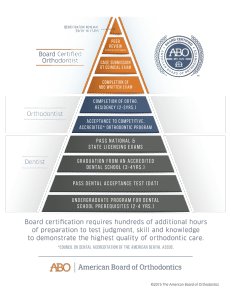Are All Orthodontists Board Certified?
No. While all orthodontists must be licensed to practice, only a little over half have advanced to become board-certified. The American Board of Orthodontics (ABO) certification is a notable achievement, marking a significant step beyond the two to three years of specialized education required to practice orthodontics.
- Requirements: Demonstrate expertise in patient care through detailed case reports.
- Process: Involves a written and clinical examination, followed by an interview with a panel of esteemed examiners to assess knowledge, clinical skills, and judgment.
- Voluntary: Not all orthodontists choose to pursue this certification.
How Many Certifying Boards Are Recognized by the American Dental Association in the Specialty of Orthodontics?
There is only one certifying board recognized by the American Dental Association in the specialty of orthodontics. The American Board of Orthodontics (ABO) holds this exclusive recognition. Established in 1929, the ABO’s mission is to enhance the quality of orthodontic care by promoting excellence through certification, education, and professional collaboration.
Why Would an Orthodontist Choose to Complete This Voluntary Certification Process?
Completing the ABO certification process signifies an orthodontist’s highest commitment to excellence.
- Commitment to Excellence: Demonstrates dedication to the orthodontic profession and the public.
- Knowledge and Skills: Shows they possess the essential knowledge and skills to treat patients to the highest standards.
- Staying Current: Reflects a commitment to staying updated with the latest advancements in patient care.
- Personal Achievement: Many orthodontists view this certification as a testament to their dedication and personal accomplishment in their specialty.
What Steps Are Required to Complete the ABO Certification Process?
The ABO certification process has evolved since its inception in 1929 to meet the demands of the specialty. Currently, it involves:
- Written Examination: A comprehensive 240-question exam covering all necessary information an orthodontist should know.
- Clinical Examination: After passing the written exam, orthodontists present detailed case reports from their practice or residency, showcasing their history of excellent patient care.
- Oral Examination: Applicants discuss their cases and are tested on various academic and clinical topics by a panel of examiners.
Successfully completing these steps grants Board Certification for a limited period. To maintain this status, orthodontists must undergo Certification Renewal every 10 years, continually demonstrating their commitment to high standards of patient care.

